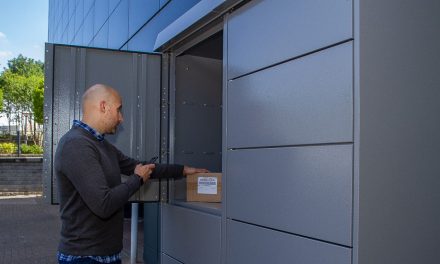
Dealing with the Christmas parcel influx

Ryan Higginson offers advice on dealing with the Christmas parcel influx
Ryan Higginson, Vice President and UK/ROI Country Leader, Global SMB Solutions, Pitney Bowes, offers three ways for businesses to cope with the influx of holiday parcels.
The majority of post rooms see a huge increase in incoming mail, particularly parcels, in December. For some, it’s an inconvenience which involves more deliveries, takes up valuable space in the post room and adds pressure to an already-stretched schedule. For others, it can result in chaos, with costly delays to the receipt of business-critical incoming mail. This year, the problem looks set to be even more profound as the phenomenal popularity in online shopping receives a further boost: 94% of consumers in a recent study1 now shop online. This fuels a growth in parcel shipping, with a predicted increase in parcel volume of up to 28% every year between now and 20212.
Some businesses solve the problem by banning Christmas presents being sent to their offices altogether. This, says the Telegraph, results in a ‘perfect storm that threatens to lead to record numbers of parcels being delivered late’. Retail experts, they say, forecast that ‘almost £4.4 billion worth of gifts will not reach homes in time for Christmas Day’3.
Click and collect and time-specific delivery slots have gone some way to ease the burden on busy mail rooms, enabling staff to collect purchases in their own time, at convenient locations. However, as we work longer hours, have less time to go into shops and stores, and are at home less frequently, a clear issue emerges. No-one wants to get home having missed a delivery – there’s little more frustrating to the weary worker than to get home to a cheery card on the doormat proclaiming “Sorry we missed you! We’ve taken your package to a depot 20 miles away!” It makes sense that we order packages to our work places, as we spend a lot of time there.
One company reveals data from a building in Canary Wharf in London, which found that 80% of parcels in the post room during the Christmas period were personal deliveries4. Employees ordering higher value items such as electronic goods, tablets and smartphones are putting even greater pressure on post room staff, who don’t want to be held responsible for these goods.
To address this, some organisations are restricting personal incoming parcels altogether, but short of opening or scanning the packages, this proves hard to police. So what else can a business – and a time-poor online shopper- do? In practice, organisations are now beginning to accept this staff requirement, and some are even going a step further rolling out technologies to improve the entire inbound mail process. Here are three ways organisations can cope during this busy time of year:
- Software
Savvy businesses are swapping the mail room clipboard for inbound package tracking software and handheld devices. Scanned and recorded as they come in, the software – which can be located in the cloud – automates the laborious manual process. Email alerts are sent to staff, prompting them to collect their items from the post room. Critical packages and documents are ensured full accountability and can be prioritised, and addressees have a variety of options for checking delivery status and location. Post rooms can allocate a specific time for collection, freeing up resources and ensuring smooth mailroom management.
- Electronic lockers
Electronic lockers enable staff to collect and deposit parcels 24 hours a day, safely and securely. The lockers can be installed at an office location, and integrated with tracking software. Research forecasts that collection of online ordering from locations such as lockers and CollectPlus stores will rise by over 260% in the next four years5. Collection points are also springing up at other convenient locations, from airports and railway stations to garages and shopping centres.
- Flexible working
Mobile technology and changes in legislation are driving flexible working practices. According to one study6, 1.5 million people in the UK work flexibly. Those businesses offering flexible working benefit from improved retention levels, reduced absenteeism and greater productivity. Giving staff the ability to work flexibly – working from home when they’re expecting an online delivery, for example – demonstrates trust and respect, and reduces the pressure on the mail room handling hoards of seasonal incoming packages.
Some organisations go a step further and give their employees a shopping day before Christmas. Admittedly, it is probably subtracted from an annual leave total, but it is welcomed all the same and goes some way to alleviating the post room’s seasonal burden. Others employ temporary staff, or hold a collection to thank post room staff.
For those companies embracing technology, combined with a flexible approach to working, the season of goodwill will begin rather than end in the mail room.
1 Pitney Bowes Global Ecommerce Study 2017
2Pitney Bowes Parcel Shipping Index
3 The Telegraph Saturday 16th December 2017
5 O2’s Future of Retail report in Internet Retailing
6 The Daily Mirror












